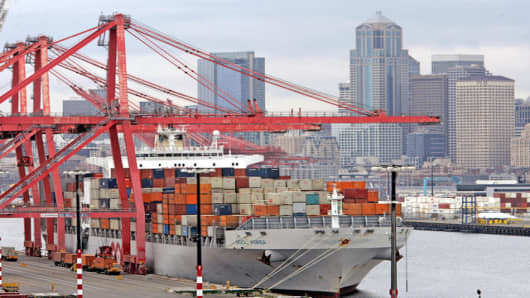There is no quick cure for what ails the U.S. and global economies, but if the Federal Reserve's emergency interest rate cut Tuesdaycan instill some confidence among consumers, companies and investors, it may speed a recovery.
Interest rate reductions take time to work, and they cannot undo the damage inflicted by the tumbling U.S. housing market and subsequent credit contraction that has curbed the flow of cash to households and businesses, pushing the economy to the brink of a recession.
For volatile world financial markets, the best hope is that the Fed's efforts, coupled with a $150 billion fiscal stimulus plan that President Bush is planning, can coax cautious consumers and companies back to normalcy and shorten any U.S. downturn, limiting the strain on the global economy.
The Fed's bold bid failed to instill confidence in shaken financial markets as U.S. stocks, playing catch-up with sell-offs around the world, fell sharply at the open. But stocks trimmed some of their lossesand closed with relatively minor declines.
Rate cuts and stimulus "won't avert a recession but will probably make it a much milder recession than it otherwise might have been," said Nariman Behravesh, chief economist at Global Insight in Lexington, Mass.
"There's a huge (market) confidence factor at play," Behravesh added. "The worry is that it spills over to consumers and businesses. That is what the Fed and the president are trying to avoid. They don't want consumers to suddenly stop spending. They don't want businesses to retreat back into their shells."
In cutting the benchmark fed funds rate by three-quarters of a percentage point to 3.5 percent Tuesday -- the biggest drop in the overnight interbank lending rate in more than 23 years -- the Fed highlighted its concern that credit conditions have tightened for households and businesses.
That is what is shaking the U.S. economic foundation and raising the specter of a recession. Consumer spending accounts for about 70 percent of U.S. economic activity, while companies hold the key to the all-important job market.
When those pillars fall, the U.S. economy invariable tanks, taking much of the world down with it. Both pillars have begun to wobble, as evidenced by a drop in December retail sales and a surprisingly weak employment report, and no amount of rate cuts can instantly steady them.
"The Fed can't make borrowers borrow and lenders lend," Peter Raskind, chief executive officer of National City Corp in Cleveland, told Reuters.
What the Fed can do is lower borrowing costs for banks and hope they will pass that along to consumers and businesses. It also can underscore its willingness to cut rates further, a stance that appeared to restore at least some confidence on Wall Street.
The confidence crisis among investors was plain to see as world financial markets sank on Monday and Tuesday.
European stock markets reversed direction and turned higher after the Fed's emergency rate cut. U.S. stocks closed lower, but the selloff likely would've been much more severe if the Fed hadn't acted.
The stock market's slide in recent weeks started to infect consumer confidence as households watched their nest eggs go up in smoke. Many Americans have relied on capital gains -- whether from rising home or stock prices -- as the cornerstone of their retirement plans. The U.S. savings rate turned negative in November.
A Reuters/Zogby poll last week showed that nearly half of Americans expect a recession in the next year. In Japan, consumer confidence has fallen to a 4-1/2 year low, and German investor sentiment hit a 15-year low in January.
When consumers feel gloomy, they curb discretionary spending, setting off a dangerous cycle in which businesses retrench because of slowing demand, jobs are cut and consumers feel even gloomier.
With credit in short supply, the confidence troubles are magnified for both households and businesses, which explains the Fed's aggressive move.
The Bank of Canada also lowered interest rates at its regularly scheduled meeting Tuesday, and investors expect the Bank of England to do the same next month. That leaves the European Central Bank under growing pressure to set aside its inflation concerns and ease as well.
"The UK markets should now be looking to a February Bank of England cut and implied lean toward much lower rates later in the year," said David Brown, chief European economist at Bear Stearns in London. "Set against this sort of G7 backdrop, the ECB's actions are conspicuous by their absence," he said, referring to the Group of Seven rich industrial nations.


